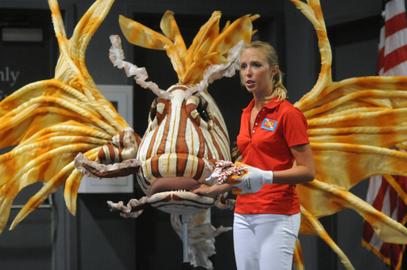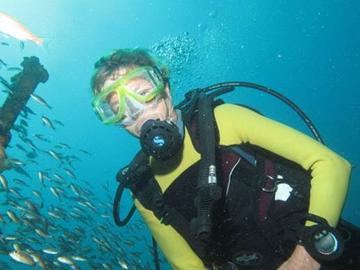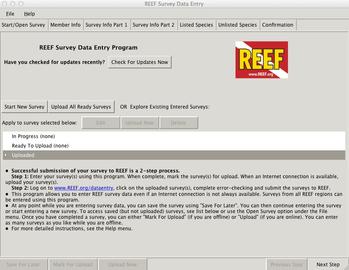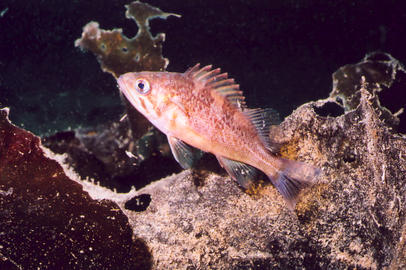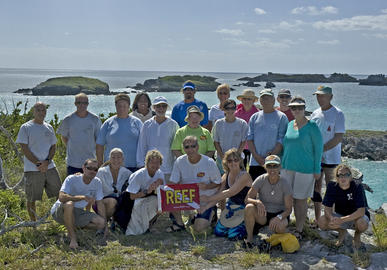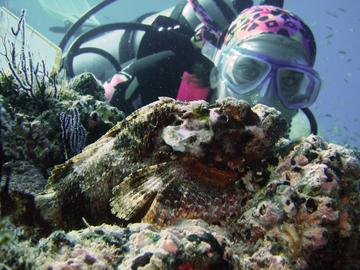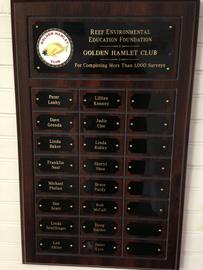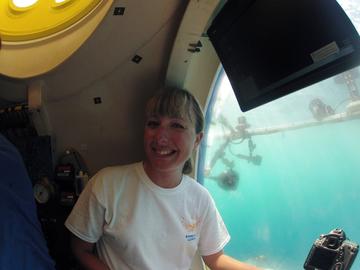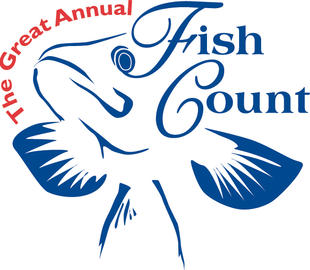After several years of planning and collaborating with local marine scientists and divers, REEF has expanded the Volunteer Fish Survey Project into another region: the South Atlantic States (SAS). Recreational and scientific divers in North Carolina, South Carolina, and Georgia now have survey materials specific to the local ecosystem, including waterproof color ID cards, waterproof survey paper, teaching curriculum, data entry, and online data summaries.
As part of our efforts to address the lionfish invasion to the western Atlantic, REEF received a grant from the US Fish and Wildlife Service Aquatic Invasive Species Program to organize and lead lionfish workshops throughout the Southeast United States. Between August and October, REEF staff Keri Kenning and Lad Akins will be traveling to more than a dozen coastal communities to present information on the lionfish invasion and hands-on demonstrations on collecting and handling.
REEF members are at the heart of our grassroots marine conservation programs. Over 50,000 divers, snorkelers, students, and armchair naturalists stand behind our mission.
Earlier this summer, we proudly released the next generation of REEF survey technology, the REEF Data Entry Program. When surveying began in 1993, divers and snorkelers wrote out each sighted fish species on a slate and submitted the surveys to the database using paper scantron forms. In 1994, we developed pre-printed underwater survey paper to make surveying easier, and in 2005 we said goodbye to bubble-filling and premiered online data entry using the Internet. The time had come to innovate yet again.
We are pleased to share the publication of two new scientific papers that utilize data collected by REEF volunteers in the Monterey Peninsula area of California. Co-authored by REEF Pacific Advanced Assessment Team (AAT) member, John Wolfe, and REEF Director of Science, Dr. Christy Pattengill-Semmens, the companion papers were published earlier this summer in the journal CalCOFI Reports.
We are pleased to share with you the the 2014 REEF Field Survey Trip schedule. We have an exciting lineup of destinations planned, and we hope you will join us. These trips offer a great introduction to fish identification for novice fishwatchers, and are a fun way for experienced surveyors to build their life list while interacting with fellow fishwatchers. REEF staff, board members, and other REEF experts lead these trips, and each features daily classroom seminars and a full diving schedule.
New Fishinars are always being added. Check out the Webinar Training page (www.REEF.org/fishinars) for the most up-to-date listing. These popular online training sessions provide fishie fun in the comfort of your own home. Fishinars are free, and open to all REEF members. You need to register for each session you want to attend. No special software is required, just a web browser. Upcoming sessions include:
Perplexing Parrotfish of the Caribbean - September 10
No, it's not a club of Shakespearean enthusiasts! Rather it's a club of citizen scientist superstars - those REEF members who have conducted 1,000+ surveys in the REEF Volunteer Fish Survey Project. The very first Golden Hamlet member was Linda Baker, achieving the status in 2005. Today, there are are sixteen members of the Golden Hamlet Club.
REEF's Director of Special Projects, Lad Akins, and REEF affiliate scientist Dr. Stephanie Green (Oregon State University) and REEF Advisory Panel member Dr. Steve Gittings (NOAA National Marine Sanctuaries) participated in the first submersible expedition to assess the lionfish invasion on deep marine habitats off South Florida June 27-29. While REEF and other scientists have studied lionfish in shallow habitats, the Antipodes lionfish expedition gave scientists the opportunity to learn about lionfish populations far below recreational diving limits.
The 22nd annual Great Annual Fish Count (GAFC) is rapidly approaching! Will you be participating? We encourage local shops, dive clubs, and other groups to organize an activity anytime during the month of July (and often training events in June). You can view events already scheduled, and add your own, by visiting www.fishcount.org.


